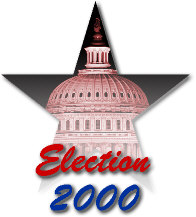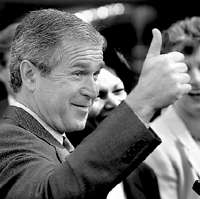![]()


Presidential candidate George W. Bush decided to take on the world of
politics shortly after his 40th birthday. College classmates describe Bush as
"personable" and "outgoing." (AP photo)
This is one of a series of political profiles produced by political psychologist Aubrey Immelman and his students in the Unit for the Study of Personality in Politics at the College of St. Benedict and St. John's University in Collegeville, Minn.
May 7, 2000
Bush needs to show voters his serious side
By Dale Fredrickson
and Aubrey Immelman
St. John's University
It's a hot, simmering day in August 1989. The new part-owner of the Texas Rangers is sitting behind the batting cage watching baseball practice. The $2,500 black eel-skin boots of the Lone Star state's future governor are clearly visible, as is the emblazoned Texas flag, which seems as vibrant as "Dubya" himself.
To those who know him best, George W. Bush the presidential candidate is a likeable, gregarious personality, charming and congenial. If ever proof was needed that character endures, Dubya would be it: college classmates characterize Bush as "personable," "outgoing," and "funny," while childhood friends describe "Junior" in similar terms.
The words commonly used to characterize Bush capture the essence of what contemporary personality theorist Theodore Millon calls the "outgoing personality pattern."
But Bush's college cronies also remember him as "mischievous" and a "prankster." These words conjure up an image of Millon's dissenting pattern — a dauntless, adventurous, unruly personality type.
As we noted in the Jan. 23 profile of George W. Bush, "Like a good old boy, Bush is congenial and well liked — as outgoing, gregarious personalities often are. And like a good old boy, he has a wild, boot-scootin' boogie streak — attributable to the adventurous facet of his personality."
Dubya's colorful life story bears witness to his outgoing streak, checkered with an unruly, dauntless element. At age 20, frat boy George was questioned, arrested, and charged with disorderly conduct following the disappearance of a wreath from a New Haven storefront. (The charges were later dropped.)
The errant scion of the Bush clan had another run-in with the law at Princeton when, with fellow frolicking Yale fans, he flattened the goal posts following a football game. This time, Bush was detained, questioned, and given 10 minutes to leave town.
For a future governor who would later invoke education as an election incantation, the budding young Bush's college years at Yale were remarkably rooted in the less cerebral components of a college education.
Following graduation from Yale, a Vietnam-era stint in the Texas Air National Guard, and armed with his natural exuberance, his daddy's connections, and an MBA from Harvard, Bush returned to Texas during the summer of 1975 to forge a career for himself in the risky oil exploration and development business.
Risky, perhaps, but not unusual for someone with an adventurous, dauntless personality with its love of high-risk challenges and penchant for living by wits and ingenuity.
Throughout his time in the oil business, Bush, by his own admission, "was drinking and carousing and fumbling around." The "so-called wild, exotic days" of his youth ended abruptly just after his 40th birthday when Bush — almost as casually as he had formerly hit the bottle — unceremoniously jumped on the wagon, reigned in his unruliness, and turned his life in a direction that would ultimately lead him to the pinnacle of power in politics.
This turning point in the life of Bush also represents a juncture where psychological inference diverges from seemingly straightforward biographical interpretation.
The conventional wisdom concerning Bush's midlife change of heart is that his wife Laura played a pivotal role, as did faith and the healing power of heart-to-heart talks with family friend Billy Graham and other pastoral advisers.
But consideration of Bush's character in broader context raises another possibility. The adventurous, dauntless personality style is a normal, adaptive variant of a personality pattern that in extreme cases emerges as the so-called "antisocial personality disorder."
Perhaps by dint of more favorable childhood experiences the socialized, adaptive adventurous style expresses itself, according to personality theorist Millon, "in behaviors that are minimally obtrusive, especially when manifested in sublimated forms, such as independence strivings, ambition, competition, risk-taking, and adventuresomeness."
But the clincher is this: According to the American Psychiatric Association's official diagnostic manual, the antisocial personality disorder "may become less evident or remit as the individual grows older, particularly in the fourth decade of life."
Ultimately, we have no way of verifying the real reason for Bush's dramatic midlife change; it's a fundamental principle of psychology that human behavior is determined by multiple causes.
Bush’s task now is to convince voters that he’s a serious candidate, not just a charmer who wants to be taken seriously. Voters, in turn, will have to weigh the evidence and decide whether youthful indiscretions should serve as a disqualification for the presidency and whether George W. Bush the man has the mettle to lead the United States into the 21st century.
Dale Fredrickson is a first-year political science major from Avon, Minn. He is collaborating in leadership studies conducted by Aubrey Immelman, associate professor of psychology at the College of St. Benedict and St. John's University, in the Unit for the Study of Personality in Politics. Joshua Jipson contributed to this article.
![]()
News | St. Cloud Times Online | CareerTimes | Classified Times | Hometimes
Copyright 2000 St. Cloud Times

